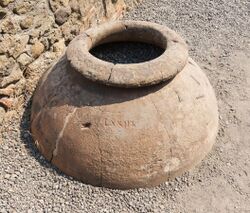Salmon (color)
 From HandWiki - Reading time: 5 min
From HandWiki - Reading time: 5 min

Salmon is a light orange to pink color, named after the color of salmon flesh.
The first recorded use of salmon as a color name in English was in 1776.[1]
The actual color of salmon flesh varies from almost white to light orange, depending on their levels of the carotenoid astaxanthin, which in turn is the result of the richness of the fish's diet of krill and shrimp; salmon raised on fish farms are given non-synthetic or artificial coloring in their food.[2][3]
The flesh of Atlantic salmon (Salmo salar) is lighter and oranger than that of the various Pacific salmon species (from the genus Oncorhynchus).[4]
Variations of salmon
| Salmon | |
|---|---|
| Hex triplet | #FA8072 |
| Source | X11[5][6] |
| ISCC–NBS descriptor | Strong reddish orange |
| Light salmon | |
|---|---|
| Hex triplet | #FFA07A |
| Source | X11[5][6] |
| ISCC–NBS descriptor | Strong yellowish pink |
| Salmon pink | |
|---|---|
| Hex triplet | #FF91A4 |
| Source | Crayola |
| ISCC–NBS descriptor | Strong pink |
| Dark salmon | |
|---|---|
| Hex triplet | #E9967A |
| Source | X11[5][6] |
| ISCC–NBS descriptor | Strong yellowish pink |
| Terra cotta | |
|---|---|
| Hex triplet | #E2725B |
| Source | DMC Color List |
| ISCC–NBS descriptor | Strong reddish orange |
Salmon pink (or salmon in Crayola crayons) was introduced by Crayola in 1949. See the List of Crayola crayon colors.
Light salmon has a yellower hue and less saturation when compared to salmon.
Dark salmon resembles the color light salmon, but is grayer. Like the web colors shown above, it is used in HTML and CSS.
Terra cotta is a tone with relatively low brightness. It resembles terracotta pottery.

See also
- List of colors
References
- ↑ Maerz and Paul A Dictionary of Color New York:1930 McGraw-Hill Page 203; Color Sample of Salmon: Page 43 Plate 10 Color Sample A7
- ↑ "Opinion of the Scientific Committee on Animal Nutrition on the use of canthaxanthin in feedingstuffs for salmon and trout, laying hens, and other poultry.". European Commission - Health & Consumer Protection Directorate. pp. 6–7. https://ec.europa.eu/food/sites/food/files/safety/docs/animal-feed_additives_rules_scan-old_report_out81.pdf.
- ↑ "The Truth About Farmed Salmon at Whole Foods Market". Whole Foods Website. https://www.wholefoodsmarket.com/blog/truth-about-farmed-salmon-whole-foods-market.
- ↑ "Atlantic and Pacific salmon: What’s the difference?". Cook Inlet. https://ciaanet.org/atlantic-and-pacific-salmon-whats-the-difference/.
- ↑ 5.0 5.1 5.2 "CSS Color Module Level 3". http://www.w3.org/TR/css3-color/#svg-color.
- ↑ 6.0 6.1 6.2 "Basic Data Types and Interfaces — SVG 2". https://www.w3.org/TR/SVG/types.html.
 |
 KSF
KSF
